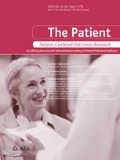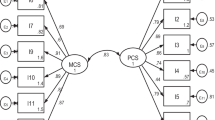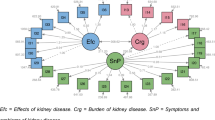Abstract
Background
To validate a widely used health outcomes instrument for patients with chronic kidney disease and on dialysis, the Kidney Disease Quality of Life questionnaire (KDQOL-36), in English-speaking haemodialysis patients in Singapore.
Methods
This study is a secondary data analysis using the KDQOL-SF (version 1.3) data collected from a cross-sectional survey of haemodialysis patients in Singapore. Cronbach’s α was used to test internal consistency reliability. Multi-item scales were assessed using item-to-scale correlation and factor analysis. Both confirmatory and exploratory factor analyses were performed separately for generic and disease-targeted scales. Construct validity was assessed by correlation between disease-targeted and generic scales. Criterion validity was assessed by correlation of the physical component summary (PCS-12) and mental component summary (MCS-12) from KDQOL-36 with the corresponding PCS-36 and MCS-36 from the KDQOL-SF.
Results
Three hundred ninety-four patients who completed the interviews in English [male 55.8 %, mean age (SD) 52.4 (11.7) years] were involved. Kidney disease scales exhibited desirable internal consistency (Cronbach’s α 0.822–0.906) and item-to-scale correlation (range 0.763–0.903), and a three-factor model fit the data well [comparative fit index (CFI) 0.934, root mean square error of approximation (RMSEA) 0.085]. For the generic Short Form 12 Health Survey (SF-12) items, a two-factor model (physical and mental) showed poor overall fit, but a three-factor structure (role, physical and mental functions) achieved good model fit (CFI 0.999, RMSEA 0.027). Correlation between disease-targeted and generic scales was weak to moderate (range 0.286–0.418). Correlation between SF-12 and SF-36 was 0.750 for PCS and 0.797 for MCS.
Conclusion
The English version of the KDQOL-36 appears to be reliable and valid to measure quality of life for haemodialysis patients in Singapore.

Similar content being viewed by others
References
Moeller S, Gioberge S, Brown G. ESRD patients in 2001: global overview of patients, treatment modalities and development trends. Nephrol Dial Transplant Off Publ Eur Dial Transplant Assoc Eur Ren Assoc. 2002;17(12):2071–6.
Schieppati A, Remuzzi G. Chronic renal diseases as a public health problem: epidemiology, social, and economic implications. Kidney Int Suppl. 2005;98:S7–10.
Choong HL. Seventh report of the Singapore Renal Registry 2007/2008. http://www.nrdo.gov.sg/uploadedFiles/NRDO/SRR_2007_2008_Report_v1.2.0_d20100807.pdf.
Hays RD, Kallich JD, Mapes DL, Coons SJ, Carter WB. Development of the kidney disease quality of life (KDQOL) instrument. Qual Life Res Int J Qual Life Aspects Treat Care Rehabil. 1994;3(5):329–38.
Walters BAJ, Hays RD, Spritzer KL, Fridman M, Carte WB. Health-related quality of life, depressive symptoms, anemia, and malnutrition at hemodialysis initiation. Am J Kidney Dis. 2002;40(6):1185–94.
The KDQOL Working Group. http://gim.med.ucla.edu/kdqol/.
Carmichael P, Popoola J, John I, Stevens PE, Carmichael AR. Assessment of quality of life in a single centre dialysis population using the KDQOL-SF (TM) questionnaire. Qual Life Res. 2000;9(2):195–205.
Saban KL, Bryant FB, Reda DJ, Stroupe KT, Hynes DM. Measurement invariance of the kidney disease and quality of life instrument (KDQOL-SF) across veterans and non-veterans. Health Qual Life Outcomes. 2010;8:120.
Braga SF, Peixoto SV, Gomes IC, de Assis Acurcio F, Andrade EI, Cherchiglia ML. Factors associated with health-related quality of life in elderly patients on hemodialysis. Rev Saude Publica. 2011;45(6):1127–36.
Veerappan I, Arvind RM, Ilayabharthi V. Predictors of quality of life of hemodialysis patients in India. Indian J Nephrol. 2012;22(1):18–25.
Gorodetskaya I, Zenios S, McCulloch CE, Bostrom A, Hsu CY, Bindman AB, Go AS, Chertow GM. Health-related quality of life and estimates of utility in chronic kidney disease. Kidney Int. 2005;68(6):2801–8.
Joshi VD, Mooppil N, Lim JF. Validation of the kidney disease quality of life-short form: a cross-sectional study of a dialysis-targeted health measure in Singapore. BMC Nephrol. 2010;11:36.
Cheung YB, Seow YY, Qu LM, Yee AC. Measurement properties of the Chinese version of the Kidney Disease Quality of Life-Short Form (KDQOL-SF) in end-stage renal disease patients with poor prognosis in Singapore. J Pain Symptom Manag. 2012;13:13.
Nunnally JC, Bernstein IH. Psychometric theory. 3rd edn. New York: McGraw-Hill; 1994.
Ware JE Jr, Gandek B. Methods for testing data quality, scaling assumptions, and reliability: the IQOLA Project approach. International Quality of Life Assessment. J Clin Epidemiol. 1998;51(11):945–52.
Ware J Jr, Kosinski M, Keller SD. A 12-Item Short-Form Health Survey: construction of scales and preliminary tests of reliability and validity. Med Care. 1996;34(3):220–33.
Hays RD, Kallich J, Mapes DL, Coons SJ, Amin N, Carter WB, Kamberg C. Kidney Disease Quality of Life Short Form (KDQOL-SF) version 1.3: a manual for use and scoring. 1997.
Kline RB. Principles and practice of structure equation modeling. 2nd edn. New York: Guilford; 2005.
Chen FN, Curran PJ, Bollen KA, Kirby J, Paxton P. An empirical evaluation of the use of fixed cutoff points in RMSEA test statistic in structural equation models. Sociol Method Res. 2008;36(4):462–94.
UCLA Academic Technology Services/Stat Computing. http://www.ats.ucla.edu/stat/.
Ware JE, Kosinski M, Keller SD. SF-12: how to score the SF-12 physical and mental health summary scales. 3rd edn: Lincoln: QualityMetric Incorporated; 1998.
Pakpour AH, Yekaninejad M, Molsted S, Harrison AP, Hashemi F, Saffari M. Translation, cultural adaptation assessment, and both validity and reliability testing of the Kidney Disease Quality of Life—Short Form version 1.3 for use with Iranian patients. Nephrology. 2011;16(1):106–12.
Park HJ, Kim S, Yong JS, Han SS, Yang DH, Meguro M, Han CW, Kohzuki M. Reliability and validity of the Korean version of Kidney Disease Quality of Life instrument (KDQOL-SF). Tohoku J Exp Med. 2007;211(4):321–9.
Ren XS, Kazis LE, Lee A, Rogers WH. The role of generic and disease-specific measures of physical and role functioning in assessing patient outcomes: a longitudinal study. J Ambul Care Manag. 2005;28(2):157–66.
Korevaar JC, Merkus MP, Jansen MA, Dekker FW, Boeschoten EW, Krediet RT. Validation of the KDQOL-SF: a dialysis-targeted health measure. Qual Life Res Int J Qual Life Aspects Treat Care Rehabil. 2002;11(5):437–47.
Montazeri A, Vahdaninia M, Mousavi SJ, Omidvari S. The Iranian version of 12-item Short Form Health Survey (SF-12): factor structure, internal consistency and construct validity. BMC Public Health. 2009;9:341.
Wee CC, Davis RB, Hamel MB. Comparing the SF-12 and SF-36 health status questionnaires in patients with and without obesity. Health Qual Life Outcomes. 2008;6:11.
Failde I, Medina P, Ramirez C, Arana R. Construct and criterion validity of the SF-12 health questionnaire in patients with acute myocardial infarction and unstable angina. J Eval Clin Pract. 2010;16(3):569–73.
Suzukamo Y, Fukuhara S, Green J, Kosinski M, Gandek B, Ware JE. Validation testing of a three-component model of Short Form-36 scores. J Clin Epidemiol. 2011;64(3):301–8.
Thumboo J, Fong KY, Machin D, Chan SP, Leon KH, Feng PH, Thio ST, Boe ML. A community-based study of scaling assumptions and construct validity of the English (UK) and Chinese (HK) SF-36 in Singapore. Qual Life Res Int J Qual Life Aspects Treat Care Rehabil. 2001;10(2):175–88.
Fuh JL, Wang SJ, Lu SR, Juang KD, Lee SJ. Psychometric evaluation of a Chinese (Taiwanese) version of the SF-36 health survey amongst middle-aged women from a rural community. Qual Life Res Int J Qual Life Aspects Treat Care Rehabil. 2000;9(6):675–83.
Yu J, Coons SJ, Draugalis JR, Ren XS, Hays RD. Equivalence of Chinese and US-English versions of the SF-36 health survey. Qual Life Res Int J Qual Life Aspects Treat Care Rehabil. 2003;12(4):449–57.
Ware JE Jr. Conceptualization and measurement of health-related quality of life: comments on an evolving field. Arch Phys Med Rehabil. 2003;84(4 Suppl 2):S43–51.
Acknowledgments
We would like to thank the Center for Health Services Research, Singapore Health Services, for sharing the data with us.
Authors’ contributions
Ms. Fan Yang and Dr. Nan Luo designed the study, did the data analysis and interpretation, and drafted the manuscript. Ms. Vivian Wei Wang, Dr. Veena Joshi and Dr. Titus Lau provided intellectual content of critical importance to the paper. All authors read and approved the final manuscript.
Conflict of interest
All authors (Ms. Fan Yang, Ms. Vivian Wei Wang, Dr. Veena Joshi, Dr. Titus Lau and Dr. Nan Luo) declare that they have no competing interests.
Author information
Authors and Affiliations
Corresponding author
Rights and permissions
About this article
Cite this article
Yang, F., Wang, V.W., Joshi, V.D. et al. Validation of the English Version of the Kidney Disease Quality of Life Questionnaire (KDQOL-36) in Haemodialysis Patients in Singapore. Patient 6, 135–141 (2013). https://doi.org/10.1007/s40271-013-0015-2
Published:
Issue Date:
DOI: https://doi.org/10.1007/s40271-013-0015-2




